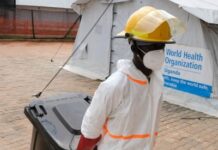Rosemary DiCarlo said entrenched divisions, economic mismanagement, continued human rights violations, and competing domestic and external interests, continue to erode unity and stability in the country.
People gather at a market in Tripoli, the capital of Libya. (file)
National reconciliation at risk
Politicization and political divisions are also hindering progress on national reconciliation, she added.
Last December, UNSMIL facilitated an agreement among three key institutions – the Presidential Council, the House of Representatives, and the High Council of State – on a draft law on the issue.
However, subsequent amendments to the draft law by parliamentarians have raised concerns over the independence of a National Reconciliation Commission.
A charter for reconciliation was agreed earlier this month through a process led by the African Union. It was adopted on 14 February in the margins of the bloc’s summit in Addis Ababa, Ethiopia.
“While some Libyan stakeholders have supported the charter, others did not,” she said, noting that UNSMIL continues to engage with all relevant parties.
Security threats persist
Meanwhile, the activities of non-State and quasi-State armed groups continue to pose a threat to Libya’s fragile stability.
Ms. DiCarlo called for a full and transparent investigation into an armed attack on a Government of National Unity (GNU) Minister in Tripoli on 12 February.
She said the Libyan National Army took control of a military base in the south previously held by a GNU-affiliated military officer. Furthermore, the 2020 Ceasefire Agreement has only been partially implemented.
“Renewed efforts by Libyan authorities to implement its remaining provisions are crucial to improve the fragile security situation and to create conditions for the reunification and reform of security institutions,” she said.
Migrants and mass graves
Turning to other challenges, she said the continuing trend of arbitrary arrests and enforced disappearances is deeply concerning and the increasing number of deaths in custody is troubling, with 15 cases recorded since March 2024.
Migrants and asylum-seekers, including children, also continue to face serious human rights violations including torture and cruel and inhumane treatment.
“The alarming and tragic discovery of mass graves following raids on human trafficking sites highlights the severe danger faced by migrants in Libya,” she said.
On 7 February a mass grave was discovered on a farm in Jikharra in the northeast; another was found a day later in Al-Kufra in the southeast. To date, 93 bodies have been exhumed.
“A full and independent investigation is critical to bring the perpetrators to justice. “This is yet another reminder of the urgent need to protect migrants and combat human trafficking,” she said.
Last December, a joint UNSMIL and UN mission to Al-Kufra engaged with local authorities, partners, refugees and host communities to strengthen humanitarian response for Sudanese refugees, who continue to flee to Libya.
Ms. DiCarlo said the chapter of the 2025 Sudan Refugee Regional Response Plan relating to Libya targets 446,000 people and requires $106 million – double the support from 2024.
She appealed to donors for their continued support to address the growing needs of Sudanese refugees in Libya and across the region.





























